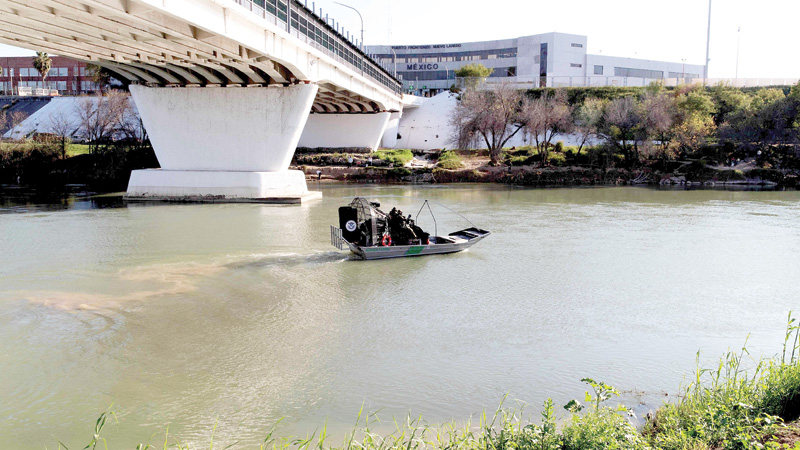

Inès BEL AIBA -
Wrapped in a down jacket, Nubia Almaguer steps quickly in the morning cold. The young Mexican has come to Texas to buy clothes for her children, and then will return home to Nuevo Laredo, on the other side of the border…
Like Almaguer, thousands of people cross back and forth every day, in cars or on foot, between Laredo, Texas and its sister city Nuevo Laredo in the Mexican state of Tamaulipas.
Veronica Echevarria is one of them. She is a US citizen, but lives in Nuevo Laredo near her parents, making the daily crossing to her job in a clothing store.
Adrian Torres, who also is an American, lives in both cities. His Mexican wife lives in Nuevo Laredo because she doesn’t have a day pass. She could get papers, but “some people don’t like” the hassle, he says with a smile.
Irma Ochoa, 63, has a weekly ritual. Every Sunday, she walks across the footbridge over the river, goes to mass at the Cathedral of San Agustin in Laredo, and then joins her lady friends for breakfast. There’s nothing really special about the outing, except that it means going through two border posts.
Close relations
The two cities have a “strong connection without a doubt,” Laredo mayor Pete Saenz, an independent, said. “We are connected economic-wise, culture-wise, socially as well.”
More than 95 per cent of Laredo’s 260,600 people identify as Hispanic, and its importance as a binational crossroads is underscored by the more than $200 billion a year in goods that are trucked in here from Mexico.
“Trade is huge with Mexico,” Saenz said.
The links are evident all around.
In the streets and in restaurants, Spanish dominates. The Virgin of Guadalupe, venerated in Mexico, is enthroned in the Cathedral of San Agustin, where mass is said in English and in Spanish.
Laredo’s inhabitants also go to the other side, sometimes to visit their families — although less so now because of crime in Nuevo Laredo — or sometimes just to buy cheaper tomatoes and onions, says Echeverria.
Others go to doctors in Mexico, again because it is much less expensive than in the United States.
But Laredo also bears the marks of the heated debate over immigration that has roiled the country since the 2016 election of Donald Trump.
Uncertainty
The US president’s incendiary rhetoric about migrants and Latinos in general “has created uncertainty” among Mexicans who come across the border to shop in Laredo, Saenz said.
The city is known for a huge mall with factory outlet stores that faces the Mexican border crossing.
The smaller stores in the city’s historic center are struggling, however, and some have closed down.
The biggest reason, according to several merchants, is the drop in the value of the Mexican peso against the US dollar in the wake of Trump’s threats.
Almaguer — who is 33 and has a visa that allows her to go to Laredo and its immediate environs, but no further — says she is making a conscious effort to do her shopping in Mexico, especially now that it has a new government led by President Andres Manuel Lopez Obrador.
“We’ve got to support it, above all,” she said.
An American storekeeper, whose business has been hurting and who asked not to be identified by name, said he understands Almaguer’s position.
After all, he says, “isn’t that what Trump is trying to do on this side?”
At the mere mention of Trump, the expression on Leonides Ibanez’s face darkens.
An elegant 66-year-old, Ibanez is the owner of a T-shirt shop.
“Sales are very low,” she says, adding that there is no doubt that Trump’s denigration of Latinos has contributed.
“A wall is to go backwards. It’s going to affect us economically and socially, morally. It’s going to affect us a lot in our pocketbooks,” she says with vehemence.
Ibanez, who came to Laredo from Puebla in Mexico 30 years ago, finds the idea of slamming the doors on migrants inconceivable.
Besides, she says, “when it comes to food, we will look for it at any price — wall or no wall.”
— AFP
Oman Observer is now on the WhatsApp channel. Click here



